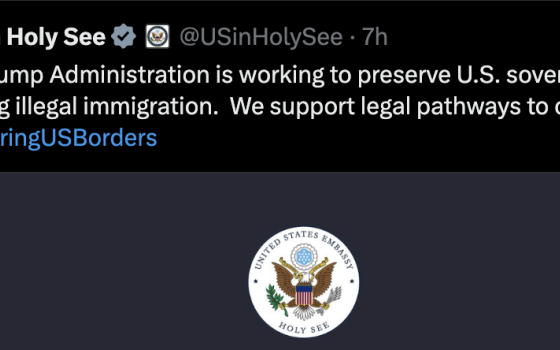In November, I gave a talk about Pope Francis at the Call to Action conference, and every story, every quote I gave about him was greeted with smiles, cheers and laughter. It was something like a papal pep rally.
In my inbox on Friday morning were no fewer than four no-nonsense messages from very upset Catholic organizations urging the signing of petitions calling on Pope Francis to apologize for Cardinal Gerhard Müller's harsh words to the Leadership Conference of Women Religious and urging him to tell the Vatican to back off the "unjust reform agenda" it imposed on U.S. nuns. It is time, several said, "to stop bullying Catholic women leaders."
My, how things have changed in six months. Of course, the vigorous scolding by Müller has been the big story in recent weeks, but his harangue (the sentiments, if not words, of which it appears the pope agrees with) is only one among a sudden outburst of hierarchical moves to parade power and retake the high ground. Here are some examples you may have seen in NCR or elsewhere.
Franciscan Fr. Jerry Zawada, a longtime human rights and peace activist, was sentenced in March by the Congregation for the Doctrine of the Faith to "a life of prayer and penance" to be lived in a Franciscan friary in Wisconsin. He may not present himself in public as a priest or celebrate the sacraments but may say Mass in private. His singular offense was concelebrating a liturgy in November 2011 with a Roman Catholic woman priest.
Fr. James Radloff was removed unexpectedly from his pastorate in Bend., Ore., and forbidden to perform public ministry. No explanation was provided by Bishop Liam Cary, who nevertheless commended Radloff for his "significant contribution" to the diocese. Radloff appealed to the Vatican, but the Congregation for Clergy upheld the priest's ouster and the bishop's decision to withhold any explanation. Radloff has since joined an Evangelical Catholic denomination.
Then there's the case of Norman Carroll, an 81-year-old deacon who has presided at countless retreats and missions during his 35 years as a cleric in the Miami archdiocese. He was instructed by Archbishop Thomas Wenski "not to present himself for any diaconal ministries" in the future. Carroll's crime apparently was telling a man in a private conversation that he felt the church had the authority to ordain women and that Pope John Paul II's ban on such ordinations was not infallible. The man contacted Wenski, who took swift action. Carroll was told in March he might apply for a "restoration of faculties" after "completing a remedial theological program to address the deficiencies in your theological understanding." Carroll declined; instead, he is moving to an Episcopal church as a deacon.
And there's Mark Zmuda, the popular vice principal at a parish school in Seattle who was fired after it was discovered he had entered a civil marriage with a same-sex partner.
And very recently comes the case of Jesuit Fr. Michael Amaladoss, an internationally known authority on interfaith relations. He has reportedly been told to cancel his lectures, halt the publication of books and write an article publicly endorsing the Vatican's views or face silencing.
These heavy-handed decisions touch hundreds, even thousands of the faithful. The 2,000 Catholic school teachers in Cincinnati will soon be required to sign a new, detailed contract that requires, among other things, that they will not marry outside the church or support those who do, that they will not practice or support a homosexual lifestyle, that they will not use or support in vitro fertilization or artificial insemination, and that they will not hold public membership in organizations whose "mission and message are incompatible with Catholic doctrine." Among the many affected teachers who have spoken out, Molly Shumate challenged the restrictions on her private life, especially her freedom to publicly support her 22-year-old gay son. A similar restrictive contract is being imposed in Oakland, Calif., where 18 percent of the Catholic school teachers are not Catholic.
What's going on here? NCR blogger Ken Briggs worries about Pope Francis' character: "Is he content projecting a Mr. Nice Guy image while giving the green light to the Vatican big boys to pursue a hard line?" NCR's Jamie Manson notes how Francis and Cardinal Müller both seem to be on the same page in their concerns about gnostic influences, which have a reputation of bringing nothing but trouble in the history of the church. Francis and Müller similarly have both spoken negatively about feminism, especially radical feminism. Others wonder if Pope Francis has adopted a "let-a-thousand-flowers-grow" mentality.
But the longer confusion remains about the pope's intentions, the more will disillusionment sour Catholics who have had such hopes for him. Still, in his talks and writings, Pope Francis insistently exhorts the church to move steadily toward real collegiality and dialogue. Soon he must indicate he means this at every level of the church, including the Vatican. If that is his aim, he and the church will need a lot of time and patience. Meanwhile, pray that this pontificate will be long, Spirit-filled, surprising and fruitful.


